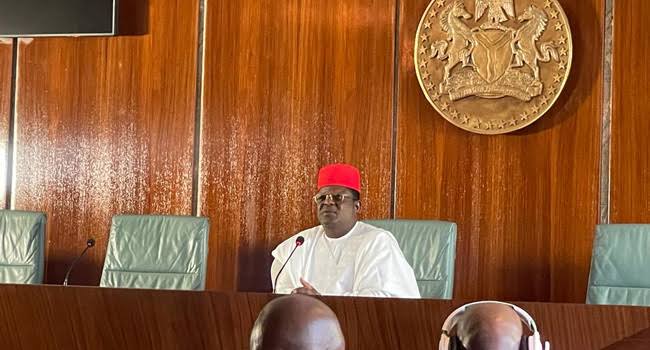The Federal Executive Council (FEC) has approved N3.09 trillion for major road projects across Nigeria, including sections of the Lagos-Calabar Coastal Highway and several other key infrastructure works in the Federal Capital Territory (FCT).
Minister of Works, Dave Umahi, disclosed this on Monday after the year’s first FEC meeting in Abuja. According to him, the approvals cover a wide range of projects aimed at improving road infrastructure and boosting connectivity across states. Among the major approvals is the Lagos-Calabar Coastal Highway, a critical project designed to enhance transportation and economic activity along Nigeria’s coastline. President Bola Tinubu has directed that work begin on the Calabar and Akwa Ibom sections while construction continues in Lagos and Ogun states. The highway, which spans 130 kilometers in this phase, is projected to cost N1.334 trillion under the EPC+10 model.
Apart from the coastal highway, Umahi revealed that N102 billion has been approved for six major road projects, including the reconstruction of sections of the Abuja–Lokoja highway. The minister noted that parts of the road, originally built by RCC and Dantata & Sawoe, have started to fail. While contractors cited high temperatures as a reason, Umahi dismissed the claim and confirmed that those sections are being rebuilt. Other key projects approved include Ado-Ekiti and Igede road projects worth N5.4 billion, road construction in Ogun, Ekiti, and Katsina states, and the reconstruction of the Third Mainland Bridge and Carter Bridge pile foundations at N3.57 billion to prevent further deterioration.
Related Posts:
- FG to scale down Lagos-Calabar coastal highway to six lanes
- President Tinubu Launches N15 Trillion Lagos-Calabar…
- Minister Unveils Plans to Demolish 750 Houses for…
- Umahi Defends Lagos-Calabar Coastal Highway, Calls…
- Lagos-Calabar Coastal Highway Phase 1 Set for May…
- Controversial Lagos-Calabar Coastal Highway Project…

FEC also approved N618.9 billion for constructing access roads to the Second Niger Bridge. The Delta State section will cost N470.9 billion, while the Anambra section will be completed for N148 billion. Additionally, the Lagos–Ibadan Expressway Phase Two, Section One, has been approved at N195 billion under the CBC model, alongside the Abuja–Karu Road contract. The government also allocated funds for major road rehabilitation projects, including the Onitsha–Owerri Expressway at N22 billion, Wusasa–Jos Road in Kaduna State at N18 billion, and three sections of the Lokoja–Benin Road in concrete: Obajana–Benin at N64 billion, Auchi–Edo at N110 billion, and the Benin Airport section at N131 billion. A road project spanning Abia and Enugu states has also been approved at N12.75 billion.

Regarding the Abuja-Kano road, Umahi confirmed that the contract previously awarded to Julius Berger had been terminated. The project has now been split into two sections: Section 1 from the FCT to the Niger State boundary, plus an additional 5.71 kilometers into Kogi State, and Section 3 in Kano, extended by 17 kilometers. This 118-kilometer stretch will also feature solar-powered street lighting and will be mostly built with concrete, except for the Kano section, which will use asphalt. The total cost for this project is estimated at N252 billion.
In the FCT, Minister of State for the FCT, Mariya Mahmoud, revealed that five infrastructure projects were approved, including the Maushi Bus Terminal Access Road at N30.97 billion to be handled by Setraco Nigeria Limited, the Arterial Road N1 from Wuye District to Ring Road 2 at N62.50 billion by Arab Contractors OAO Nigeria Limited, the Kuje–Gwagwalada Dual Carriageway at N67.50 billion by Gilmore Engineering Nigeria Limited, the Old Keffi Road Rehabilitation spanning 15 kilometers from Kado Village to Dei-Dei at N26.87 billion by Lubric Construction Company Limited, and the Renewed Hope Cities Access Road covering Cadastral Zone V06 & Karsana West, Abuja, at N31.66 billion also by Lubric Construction Company Limited.
Minister of Transportation, Said Alkali, also announced FEC’s approval of a $45.3 million feasibility study and engineering design for a new road alignment. The proposed road will connect the Badagry Deep Sea Port to Tin Can Island, Tin Can to Apapa, Lekki Sea Port to Ijebu Ode, and finally link Kajola to the Lagos-Kano-Maradi railway modernization project. With these approvals, the government is taking significant steps to upgrade Nigeria’s road network, enhance connectivity, and drive economic growth.



